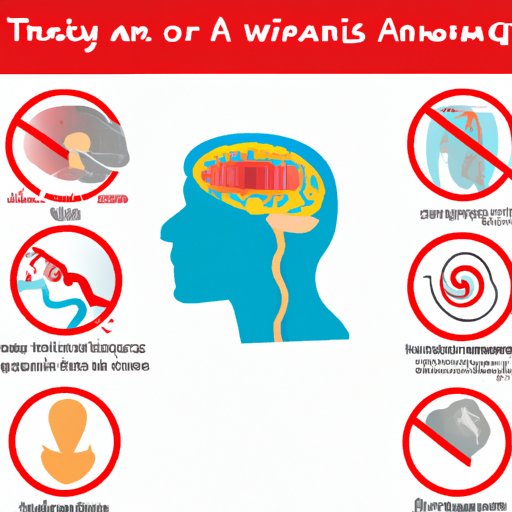
Introduction
A brain aneurysm is a serious and potentially life-threatening condition that affects a significant number of people each year. This medical emergency occurs when an artery in the brain weakens and bulges, which can lead to a burst blood vessel and bleeding on the surface of the brain. While the causes of brain aneurysms are not yet fully understood, it is important to recognize the warning signs associated with this condition so that you can take immediate action if necessary.
Don’t Ignore These Warning Signs: Symptoms of a Brain Aneurysm
A brain aneurysm can cause a number of symptoms that may be sudden and severe. Some warning signs of a brain aneurysm include:
Sudden Severe Headache
One of the most common symptoms of a brain aneurysm is a sudden and severe headache that comes on without warning. This type of headache may be described as “the worst headache of your life” and may be accompanied by a stiff neck, nausea, and vomiting.
Blurred Vision and Sensitivity to Light
Another sign of a brain aneurysm is blurred vision or a change in vision, as well as sensitivity to light or pain behind the eyes.
Numbness and Weakness
If an aneurysm ruptures and begins to bleed, it can cause numbness or weakness in one side of the face or body. This symptom may be similar to the symptoms of a stroke and requires immediate medical attention.
Difficulty Speaking and Confusion
Some people may experience difficulty speaking or confusion when they have a brain aneurysm. This may be a sign that the aneurysm has ruptured and is causing bleeding in the brain.
It is important to note that not everyone with a brain aneurysm will experience symptoms. For those who do, however, it is critical to seek medical attention immediately.
A Silent Killer: Identifying the Signs of a Brain Aneurysm
Brain aneurysms can often go undetected until it is too late. In fact, many people who experience a rupture of a brain aneurysm do not realize they have one until it bursts. That’s why it is essential to be aware of the warning signs and seek medical attention as soon as possible. Medical imaging techniques, such as CT scans and MRIs, can help to identify brain aneurysms before they rupture and cause serious problems.
When Headaches Aren’t Just Headaches: Recognizing Brain Aneurysm Symptoms
Headaches are a common symptom of a brain aneurysm, but it is important to understand the difference between a normal headache and one that is caused by an aneurysm. Typically, a headache caused by a brain aneurysm will be sudden and severe, unlike a regular headache that may be dull and persistent. If you experience a headache that comes on suddenly and is accompanied by any of the other symptoms of a brain aneurysm, seek medical attention immediately.
A Life-Threatening Condition: Understanding the Symptoms of Brain Aneurysm
An untreated brain aneurysm can be life-threatening, which is why it is so important to recognize the symptoms and seek treatment as soon as possible. If a brain aneurysm ruptures, it can cause bleeding in the brain that can lead to stroke, brain damage, or even death. Even with prompt medical attention, however, the risk of complications remains high.
How to Spot the Symptoms of a Brain Aneurysm Before It’s Too Late
There are several things you can do to help identify the symptoms of a brain aneurysm before it’s too late:
Know Your Risk
Some individuals are at a higher risk of developing a brain aneurysm, including those with a family history of the condition and those with a history of smoking or drug use. If you are in a high-risk category, it is important to be especially vigilant for the warning signs of a brain aneurysm.
Pay Attention to Your Body
Be aware of any sudden changes in your body, especially if they are accompanied by severe headaches or other neurological symptoms.
Seek Medical Attention Immediately
If you experience any of the symptoms associated with a brain aneurysm, don’t hesitate to seek medical attention. This is a medical emergency that requires immediate treatment to prevent serious complications.
Conclusion
Brain aneurysms are a serious medical condition that can be life-threatening if left untreated. By recognizing the warning signs and seeking medical attention as soon as possible, you can take steps to protect yourself and your loved ones from the risks associated with this condition. If you experience any of the symptoms discussed in this article, don’t hesitate to seek medical attention immediately.





